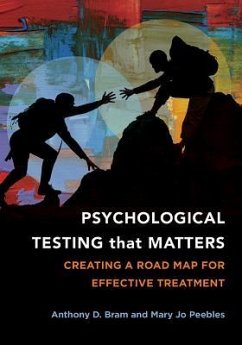Anthony D Bram, Mary Jo Peebles
Psychological Testing That Matters
Creating a Road Map for Effective Treatment
Anthony D Bram, Mary Jo Peebles
Psychological Testing That Matters
Creating a Road Map for Effective Treatment
- Gebundenes Buch
- Merkliste
- Auf die Merkliste
- Bewerten Bewerten
- Teilen
- Produkt teilen
- Produkterinnerung
- Produkterinnerung
Psychological test reports often lack clinical relevance. This book's treatment-centered approach to psychological testing describes diagnosis, assessment, and how to consolidate test findings and communicate them clearly in the report.
Andere Kunden interessierten sich auch für
![Validity Testing in Child and Adolescent Assessment Validity Testing in Child and Adolescent Assessment]() Validity Testing in Child and Adolescent Assessment90,99 €
Validity Testing in Child and Adolescent Assessment90,99 €![Preventing Workplace Substance Abuse: Beyond Drug Testing to Wellness Preventing Workplace Substance Abuse: Beyond Drug Testing to Wellness]() Preventing Workplace Substance Abuse: Beyond Drug Testing to Wellness18,99 €
Preventing Workplace Substance Abuse: Beyond Drug Testing to Wellness18,99 €![Why Language Matters for Theory of Mind Why Language Matters for Theory of Mind]() Janet Wilde Astington / Jodie A. Baird (eds.)Why Language Matters for Theory of Mind136,99 €
Janet Wilde Astington / Jodie A. Baird (eds.)Why Language Matters for Theory of Mind136,99 €![The Mindfulness Matters Program for Children and Adolescents The Mindfulness Matters Program for Children and Adolescents]() Randye J SempleThe Mindfulness Matters Program for Children and Adolescents72,99 €
Randye J SempleThe Mindfulness Matters Program for Children and Adolescents72,99 €![Psychological Testing Psychological Testing]() David BartramPsychological Testing524,99 €
David BartramPsychological Testing524,99 €![Why Beauty Matters. The Transformational Experiences of Art and Music upon the Human Soul Why Beauty Matters. The Transformational Experiences of Art and Music upon the Human Soul]() Cyrus ManassehWhy Beauty Matters. The Transformational Experiences of Art and Music upon the Human Soul13,99 €
Cyrus ManassehWhy Beauty Matters. The Transformational Experiences of Art and Music upon the Human Soul13,99 €![Psychological Testing of American Minorities Psychological Testing of American Minorities]() Ronald J. SamudaPsychological Testing of American Minorities193,99 €
Ronald J. SamudaPsychological Testing of American Minorities193,99 €-
-
-
Psychological test reports often lack clinical relevance. This book's treatment-centered approach to psychological testing describes diagnosis, assessment, and how to consolidate test findings and communicate them clearly in the report.
Hinweis: Dieser Artikel kann nur an eine deutsche Lieferadresse ausgeliefert werden.
Hinweis: Dieser Artikel kann nur an eine deutsche Lieferadresse ausgeliefert werden.
Produktdetails
- Produktdetails
- Verlag: American Psychological Association (APA)
- Seitenzahl: 468
- Erscheinungstermin: 17. Februar 2014
- Englisch
- Abmessung: 259mm x 183mm x 28mm
- Gewicht: 998g
- ISBN-13: 9781433816741
- ISBN-10: 1433816741
- Artikelnr.: 40309391
- Herstellerkennzeichnung
- Produktsicherheitsverantwortliche/r
- Europaallee 1
- 36244 Bad Hersfeld
- gpsr@libri.de
- Verlag: American Psychological Association (APA)
- Seitenzahl: 468
- Erscheinungstermin: 17. Februar 2014
- Englisch
- Abmessung: 259mm x 183mm x 28mm
- Gewicht: 998g
- ISBN-13: 9781433816741
- ISBN-10: 1433816741
- Artikelnr.: 40309391
- Herstellerkennzeichnung
- Produktsicherheitsverantwortliche/r
- Europaallee 1
- 36244 Bad Hersfeld
- gpsr@libri.de
Anthony D. Bram, PhD, is a psychologist and psychoanalyst in private practice in Lexington, MA, where he conducts psychological testing, psychodynamic and cognitive–behavioral therapy, and psychoanalysis with children and adults. Dr. Bram is a clinical instructor in psychology in the Department of Psychiatry at Cambridge Health Alliance/Harvard Medical School and is on the faculty of the Boston Psychoanalytic Society and Institute. He received his doctorate from the University of Kansas and is a graduate of the postdoctoral training program at the Menninger Clinic in Topeka, Kansas, where he was subsequently a staff psychologist. Dr. Bram completed adult psychoanalytic training at the Greater Kansas City Psychoanalytic Institute, and he is an advanced candidate in child psychoanalysis in the St. Louis Psychoanalytic Institute. He has received a fellowship from the American Psychoanalytic Association, the Martin Mayman Award from the Society for Personality Assessment, Scientific Writing Award from the Menninger Clinic, and the Johanna Tabin Book Proposal Prize from APA Division 39 (Psychotherapy). Mary Jo Peebles, PhD, ABPP, ABPH, did her undergraduate work in psychology at Wellesley College and received her doctorate in clinical psychology from Case Western Reserve University, where her dissertation advisor was Irving Weiner, PhD. She completed two postdoctoral fellowships, one in child and adolescent psychology at the University of Texas Medical Branch in Galveston, Texas, and the other in adult psychology at the Menninger Clinic in Topeka, Kansas. For nearly two decades, she practiced, taught, and supervised psychological testing at the Menninger Clinic in Topeka as a member of Menninger's Psychology Postdoctoral Fellowship Training Committee and as a supervisor and associate professor in the Karl Menninger School of Psychiatry, where she won awards regularly for her teaching and supervision. Dr. Peebles is a member of the American Psychoanalytic Association, has trained in family systems therapy, biofeedback, and eye movement desensitization and reprocessing, is board certified in clinical psychology and clinical hypnosis, and worked as a member of the medical staff at Chestnut Lodge Hospital. She has given workshops and presentations nationally and internationally on trauma, therapy planning, and psychological testing and is the author of numerous articles on these topics as well as two editions of her book, Beginnings: The Art and Science of Planning Psychotherapy (2002; 2012), which has been translated into Japanese. Since 2000, Dr. Peebles has been working with children, adolescents and adults in private practice in Bethesda, Maryland.
Acknowledgments
Introduction
I. Basic Framework
1. Treatment-Centered Diagnosis and the Role of Testing
2. Principles of Inference-Making
3. Test Referral and Administration
II. Key Psychological Capacities to Assess and Where to Look in the Data
1. Reality Testing and Reasoning
2. Emotional Regulation: Balance and Effectiveness
3. Experience of Self and Other: Implications for the Therapeutic
Alliance
4. Experience of Self and Other: Narcissistic Vulnerabilities
III. Diagnostic Considerations
1. Underlying Developmental Disruption
2. Assessing Underlying Developmental Disruption: Case Examples
IV. Putting It All Together
1. Communicating Our Findings: Test Report Writing and Feedback
2. Detailed Case Example With Sample Report
References
Index
About the Authors
Introduction
I. Basic Framework
1. Treatment-Centered Diagnosis and the Role of Testing
2. Principles of Inference-Making
3. Test Referral and Administration
II. Key Psychological Capacities to Assess and Where to Look in the Data
1. Reality Testing and Reasoning
2. Emotional Regulation: Balance and Effectiveness
3. Experience of Self and Other: Implications for the Therapeutic
Alliance
4. Experience of Self and Other: Narcissistic Vulnerabilities
III. Diagnostic Considerations
1. Underlying Developmental Disruption
2. Assessing Underlying Developmental Disruption: Case Examples
IV. Putting It All Together
1. Communicating Our Findings: Test Report Writing and Feedback
2. Detailed Case Example With Sample Report
References
Index
About the Authors
Acknowledgments
Introduction
I. Basic Framework
1. Treatment-Centered Diagnosis and the Role of Testing
2. Principles of Inference-Making
3. Test Referral and Administration
II. Key Psychological Capacities to Assess and Where to Look in the Data
1. Reality Testing and Reasoning
2. Emotional Regulation: Balance and Effectiveness
3. Experience of Self and Other: Implications for the Therapeutic
Alliance
4. Experience of Self and Other: Narcissistic Vulnerabilities
III. Diagnostic Considerations
1. Underlying Developmental Disruption
2. Assessing Underlying Developmental Disruption: Case Examples
IV. Putting It All Together
1. Communicating Our Findings: Test Report Writing and Feedback
2. Detailed Case Example With Sample Report
References
Index
About the Authors
Introduction
I. Basic Framework
1. Treatment-Centered Diagnosis and the Role of Testing
2. Principles of Inference-Making
3. Test Referral and Administration
II. Key Psychological Capacities to Assess and Where to Look in the Data
1. Reality Testing and Reasoning
2. Emotional Regulation: Balance and Effectiveness
3. Experience of Self and Other: Implications for the Therapeutic
Alliance
4. Experience of Self and Other: Narcissistic Vulnerabilities
III. Diagnostic Considerations
1. Underlying Developmental Disruption
2. Assessing Underlying Developmental Disruption: Case Examples
IV. Putting It All Together
1. Communicating Our Findings: Test Report Writing and Feedback
2. Detailed Case Example With Sample Report
References
Index
About the Authors








